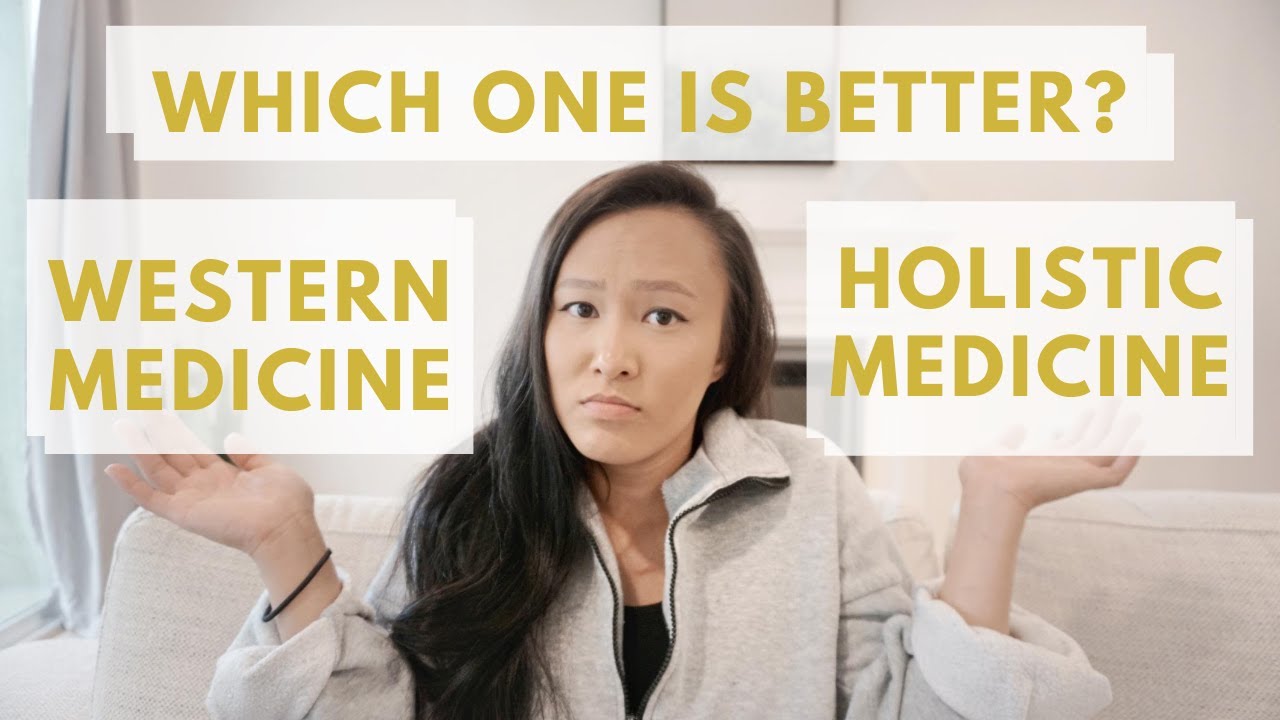In order to cure the full person, Holistic Medicine VS Western Medicine with practices more common in Eastern or Chinese medicine. There are a number distinct ways that holistic medicine may be performed, and each practitioner that you come into contact with may use a somewhat different complementary or alternative medicine approach.
It is expected that, as part of this practice, you will address and take care of both your mental and physical health by addressing physical symptoms, using herbal medicine to help with pain management and chronic pain, and using spiritual counseling to help improve your mental well-being and mental clarity.
Explore the Contents
Difference in Holistic Medicine VS Western Medicine?

In contrast to the conventional medical practices used in Western societies, the holistic care approach to health takes into account the whole person.
This is particularly true when it comes to the mental and emotional healing process. The traditional method places a greater focus on energy and spirit in the treatment of anxiety and stress, as well as adopting good lifestyle adjustments and even beginning therapy. When compared to Holistic Medicine VS Western Medicine, which often requires patients to make an appointment to see their doctor in person, the practitioner will likely do some diagnostic tests to figure out what is wrong with the patient, and based on the results, they will devise a treatment plan that will most likely include taking medication.
To promote wellbeing via the use of meditation, talk therapy, acupuncture, healthy connections with food, self-care, massage therapy, and other parts of traditional Chinese medicine is the overall goal of the treatment and strategy that is known as holistic health.
Overall Health

When you experience the least amount of deviation from your typical self, you are in the best possible health. Whether it means finally feeling stress alleviation, reduced worry, a heightened awareness of the spiritual world, less symptoms of sickness, disease, or chronic pain, or an overall healthier way of life, this goal should be achieved.
Your cognitive health is one of the many facets that make up your overall health, and receiving holistic therapy is one way in which this facet of your health may drastically improve.
This technique places a significant emphasis on the energy that is all around you and the environment that you are in, Holistic Medicine VS Western Medicine not only influences the mental health but also the physical health of the practitioner. They are interconnected components of your general state of health.
Physical Health
One may look at the holistic approach and the method of alternative medicine as just being old healing traditions; nevertheless, the practices allow for a deeper awareness of your health and enables you to focus on mending your “whole person” or mind, body, and spirit.
Acupuncture, meditation, yoga, pilates, and other Holistic Medicine VS Western Medicine health techniques allow you to channel methods to relieve chronic illnesses such as muscular pain, nerve pain, blood pressure, and weight gain that may have been difficult to ease in other contexts.
Using these mental healing methods, it is possible to immediately address physical complaints, and the underlying reason of each specific ailment may be identified. When compared to Holistic Medicine VS Western Medicine, you will notice that the treatment of physical and cognitive symptoms is highly different from one another and is done in a distinct manner. The majority of primary care clinics do not provide treatment for cognitive problems but instead will refer patients to a psychologist or psychiatrist. The purpose of holistic health is to attempt to treat disorders that affect the whole body with easy practices that are incorporated into your daily routine.
Traditional medical practitioners are able to evaluate their patient’s symptoms and the body as a whole; nevertheless, the treatment plan does not take into account the spiritual concepts that, when applied appropriately, may alleviate pain and sickness in the same way that holistic health can.
Mental Health
Even though we’ve gone a long way, there is still more of a stigma around prioritizing a healthy mind and its treatment compared to the concept of holistic health. Cognitive health and all that comes along with it is treated in a completely different light than Holistic Medicine VS Western Medicine.
The first step in the healing process involves adopting a holistic perspective and engaging in activities like meditation, yoga, crystal healing, modifying one’s diet, receiving acupuncture, and learning to better manage one’s stress and physical discomfort.
When it comes to this issue, the first line of defense that Western medicine often takes is to prescribe medication and engage in treatment. There is a world of difference between the two ways, yet both could be helpful depending on the symptoms and the make-up of the individual.
Environmental Factors

Environmental considerations play a significant role in both Holistic Medicine VS Western Medicine approaches to medical care. Many aspects of a person’s lifestyle have been linked to the development of disease and sickness. One excellent illustration of this is the way in which one’s geographical location may impact their nutrition. The cultural importance of food and its quality may vary greatly from one area to the next.
Seasonal depression may become a significant factor in both the physical and mental well-being of an individual when they live in surroundings and locales that encourage them to spend the majority of their time inside. Climate has a role in the development of this condition. This is also the case with traditional medicine, but it is not given as much thought. When you go to the doctor, they will often ask you whether you feel comfortable at home. However, they will not ask questions to get a sense for the full environment in which you live or work in order to determine how it may influence your health.
It’s possible to take a different approach to this and treat it in a variety of ways, depending on whether or not you lean more toward holistic health or more conventional medical therapies.
Lifestyle Changes
When we least anticipate it, our way of life may shift, or we may feel compelled to make a change in order to prioritize our health or the health of the environment. Altering your food or introducing mind and meditation activities into your daily routine are two of the various approaches that may be taken in this regard.
No matter how you choose to address your health and wellbeing, there will be aspects of your life that need to change, and it will take some time to get used to these new aspects. When it comes to holistic health, the procedure is believed to be more forgiving and to unfold in a more methodical fashion. In the practice of traditional medicine, procedures such as regular diagnostics, pharmaceutical trials, and the like may be taxing on the body.
The adjustments to your way of life that you make as part of your path toward Holistic Medicine VS Western Medicine are specific to you and are essential to your ability to properly incorporate these practices into your routine.
Reduce Stress
Everyone wants to have less stress in their lives, but sometimes life may seem like it’s taking over and becoming overwhelming. Both Holistic Health vs Western Medicine seek to alleviate the symptoms of anxiety, but they approach the problem from quite different angles.
One who follows an approach to health that is holistic may discover that activities like meditation, yoga, and going to therapy on a regular basis are useful in lowering their stress levels. On the other hand, one person could believe that improving their physical health by changing their eating habits, getting more exercise, and taking multivitamins would be the most effective approach.
Managing stress in a manner that is appropriate for the individual patient is obviously something that might vary greatly from one physician to the next. It is crucial to keep in mind that wellbeing in all spheres of life, including the physical, the emotional, and the mental, must be addressed in order to achieve optimal functioning. Within the realm of conventional medicine, stress is often regarded with disdain. Traditional medicine may recommend making adjustments to one’s diet and beginning an exercise program, but these are pretty much the only solutions it offers for dealing with the symptoms of stress. The true emphasis of holistic health is on the underlying causes of stress as well as the ways in which stress manifests itself across the rest of the body and mind.
Doing research on Holistic Medicine VS Western Medicine and traditional pharmacological methods to alleviate anxiety and stress will assist you in making an educated selection and perhaps combining methods to ensure that your choice is congruent with your values and preferences.
What is the meaning of holistic wellness?

The pursuit of Holistic Medicine VS Western Medicine involves making simultaneous efforts to improve one’s physical, mental, social, and spiritual health in addition to one’s overall well-being. When compared to conventional treatment, each of these facets is addressed individually, and the concept of spiritual wellbeing is often left out of the equation altogether.
This is done via the use of a wide variety of techniques and practices that treat difficulties affecting the whole body at the same time. As an example, you may try meditating, getting acupuncture, or practicing yoga in order to get mental and spiritual clarity, manage muscular discomfort, and get some exercise.
This is exceptional since, in Holistic Medicine VS Western Medicine, one would have to make contact with a number of professionals in order to handle each individual problem with the mind and body, as well as seek assistance from sources outside the regular medical area in order to meet any spiritual need.
The overarching purpose of holistic medicine is to concurrently treat problems that affect the mind, the body, and the spirit. When it comes to traditional medicine(Holistic Medicine VS Western Medicine), there is often a communication gap between those in the cognitive field and those in the medical field. They are handled as if they are distinct entities, which often results in improper treatment or the continual misdiagnosis of illnesses and conditions in a patient throughout their lifetime.
Read More: Marketing to Generation Z: Strategies for Reaching the New Digital Native 2023
Conclusion (Holistic Medicine VS Western Medicine)
Because every individual is one of a kind and every patient will have a unique course of treatment, it is critical to discuss any potential health decisions with your primary care physicians first.
The integrative and holistic method of approaching health and wellness may be of tremendous benefit, and it offers a wide range of treatment options for a wide variety of illnesses, diseases, and the general stress of daily life; nonetheless, it is vital to discuss these options with your primary care physician.
Holistic Medicine VS Western Medicine are very different from one another, and an individual may discover that some components of holistic health are more useful than others. Of course, it is possible to mix the two, since they are not incompatible with one another.
Traditional medical care may still address issues relating to one’s physical health, but holistic health therapies can also address issues relating to one’s mental, emotional, and spiritual well-being.
Read More: The Key Elements of a Successful Marketing Strategy 2023




